Key results and insights from a survey of HR professionals in organizations across 5 key markets (Hong Kong, Singapore, the US, UK, and UAE), exploring the impact of health and well-being benefits on workforces.
Human Resources (HR) leaders agree that offering quality well-being benefits should be a top priority for employers. Our survey of HR professionals across five key markets (Hong Kong, Singapore, United Arab Emirates, United Kingdom, and United States) found that leaders who prioritize a happy, healthy workplace can increase employee motivation and engagement (echoing recent findings published by the World Economic Forum).
But it also offers a note of caution: simply checking the health coverage box is not enough. Employers need to be thoughtful with the benefits they offer, enabling employees to use all their benefits to the full. They also need to lead by example, establishing a workplace culture that promotes every aspect of well-being.
"At Cigna Healthcare Hong Kong, we take a preventive approach to support the well-being of those we serve. We believe employers can support their employees’ well-being by investing in quality health benefits and wellness programs. We are committed to helping our clients promote a health-first work culture by accelerating our investments in health capabilities such as data & analytics, as well as offering various wellness programs based on employees’ needs, in addition to our comprehensive Global Health Benefits."
Jonathan Spiers, CEO, Cigna Healthcare Hong Kong
Employers recognize the importance of healthcare benefits
The HR leaders we spoke with confirmed that employers strongly believe offering quality healthcare benefits provides employees and their families with the means to live a healthier life and leads to better outcomes for their organization. However, employees' well-being is more than just a means to better retention or productivity. In fact, it ranks as the most important priority among HR leaders in international organizations, and only just behind employee retention among those representing domestic companies.
How do health and well-being benefits impact business outcomes?
In addition to helping employees stay healthy, prospective and current employees see these benefits as a central part of employer offerings and are more likely to join or stay with an organization that invests in their long-term health and well-being.
Among HR leaders, 65% believe health insurance plays a crucial role in talent attraction, 63% say it is important for enhancing employee loyalty, and two-thirds (66%) believe it reinforces a company culture that supports health. They also believe health and well-being directly improves employee productivity and engagement, measured through the number of working hours, level of absenteeism, and number of sick days reported. This is corroborated by our previous survey on employee well-being, where nine in ten employees said that a robust health and well-being program brings benefits to employees and the organization. Specifically, they are most likely to say this kind of program will create a more positive work environment (56%) and make them more productive at work (52%).
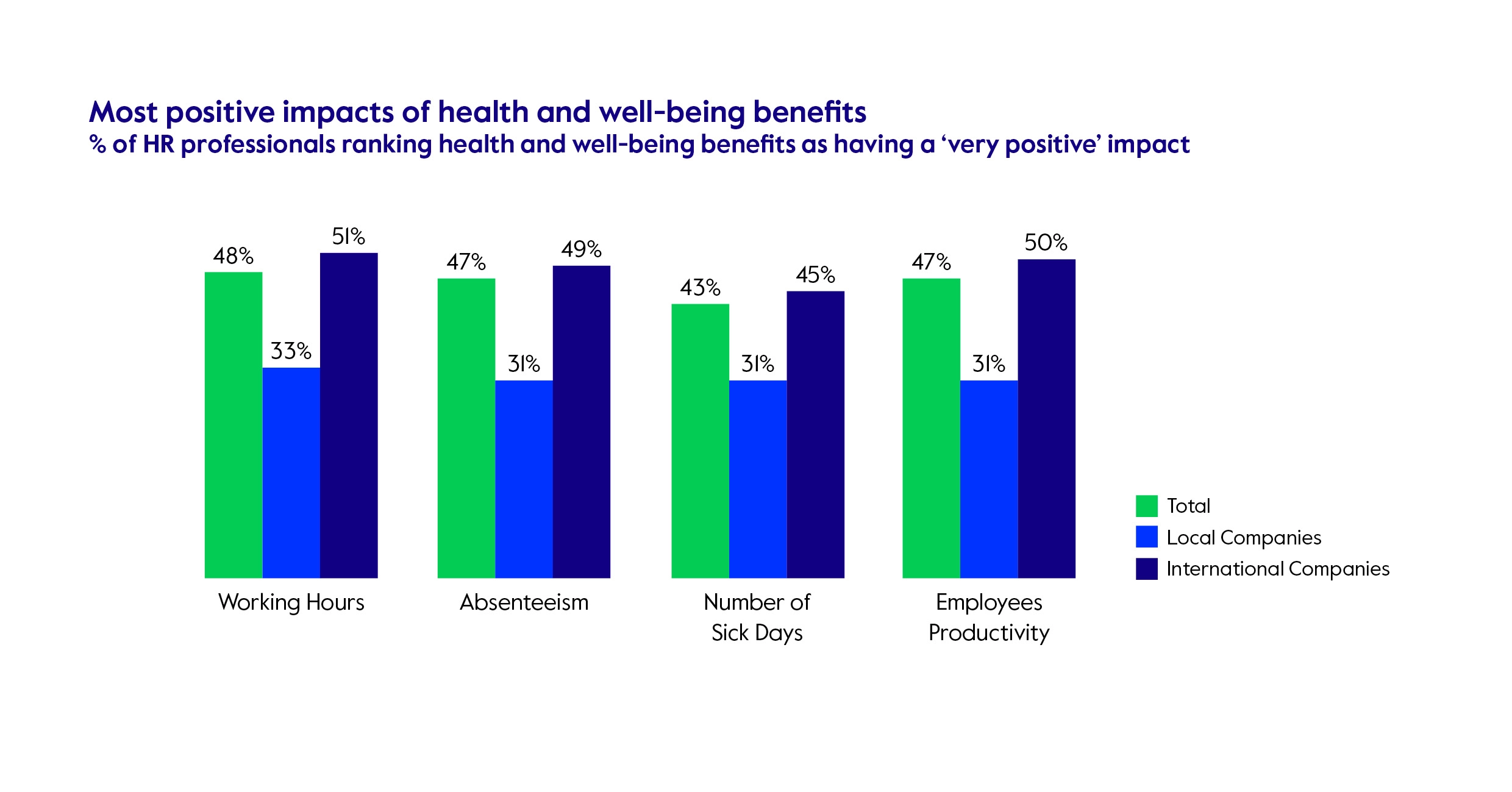
Download the flyer to read Hong Kong results
Both international and local organizations recognize the positive impact of health and well-being benefits on employee productivity and engagement. But international companies are significantly more likely to observe a positive impact on all the relevant KPIs. This could be explained by the fact that international organizations typically offer a wider range of health and well-being benefits (see Section 2).
When we look more closely at the different types of health and well-being benefits offered, traditional health benefits have the biggest positive impact in terms of shortening working hours, while mental health and preventive health is most effective in improving employee productivity.
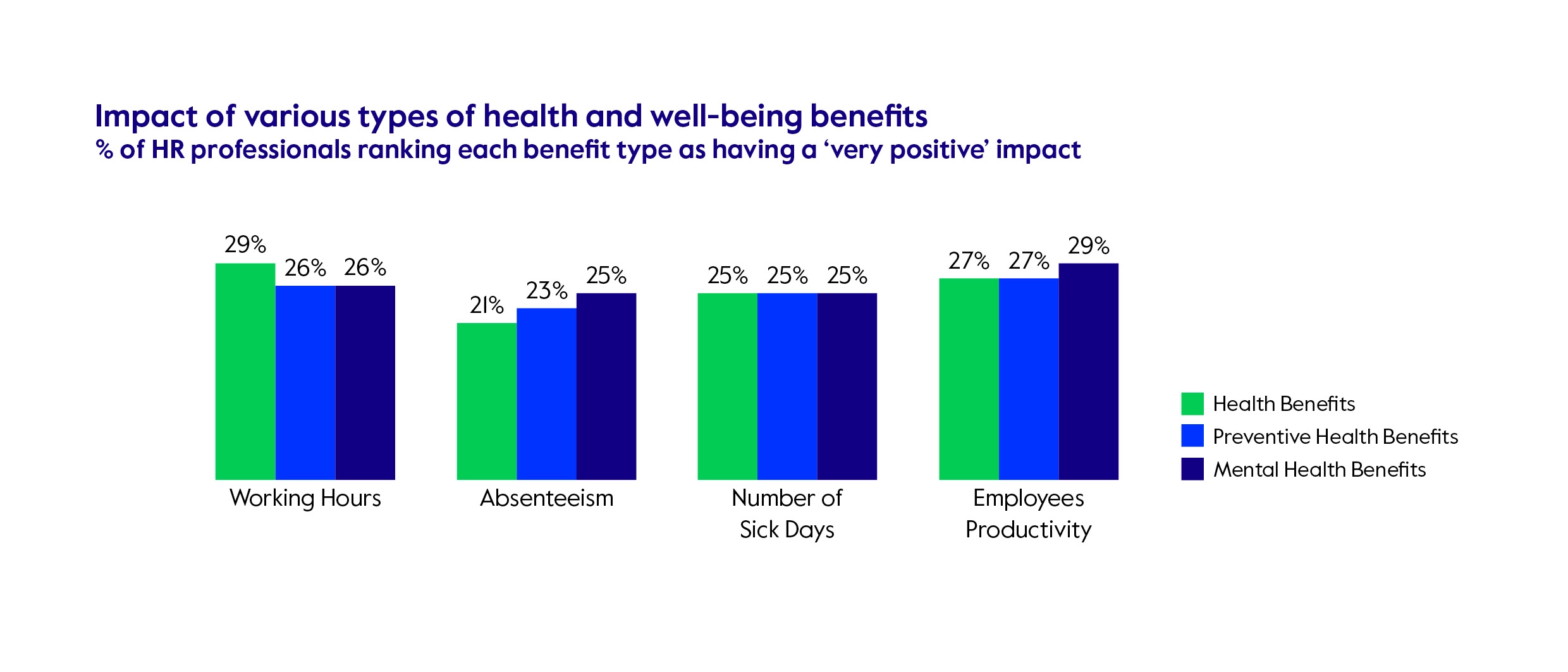
The verdict is clear from both HR leaders and employees: health and well-being benefits do raise employee health and vitality, enhancing business performance. Moreover, they are seen as an indispensable employee value proposition (EVP).
Health and well-being benefits is a top employer value proposition
Where are employers focusing their employee support?
Health and well-being benefits are widely recognized as a major determining factor for talent attraction and retention. It is one of the most common EVPs, offered by 93% of employers, and HR professionals say it is the highest value benefit for attracting new talent. In fact, health benefits are considered more impactful than career progression or time off / flexible working arrangements, particularly among local companies.
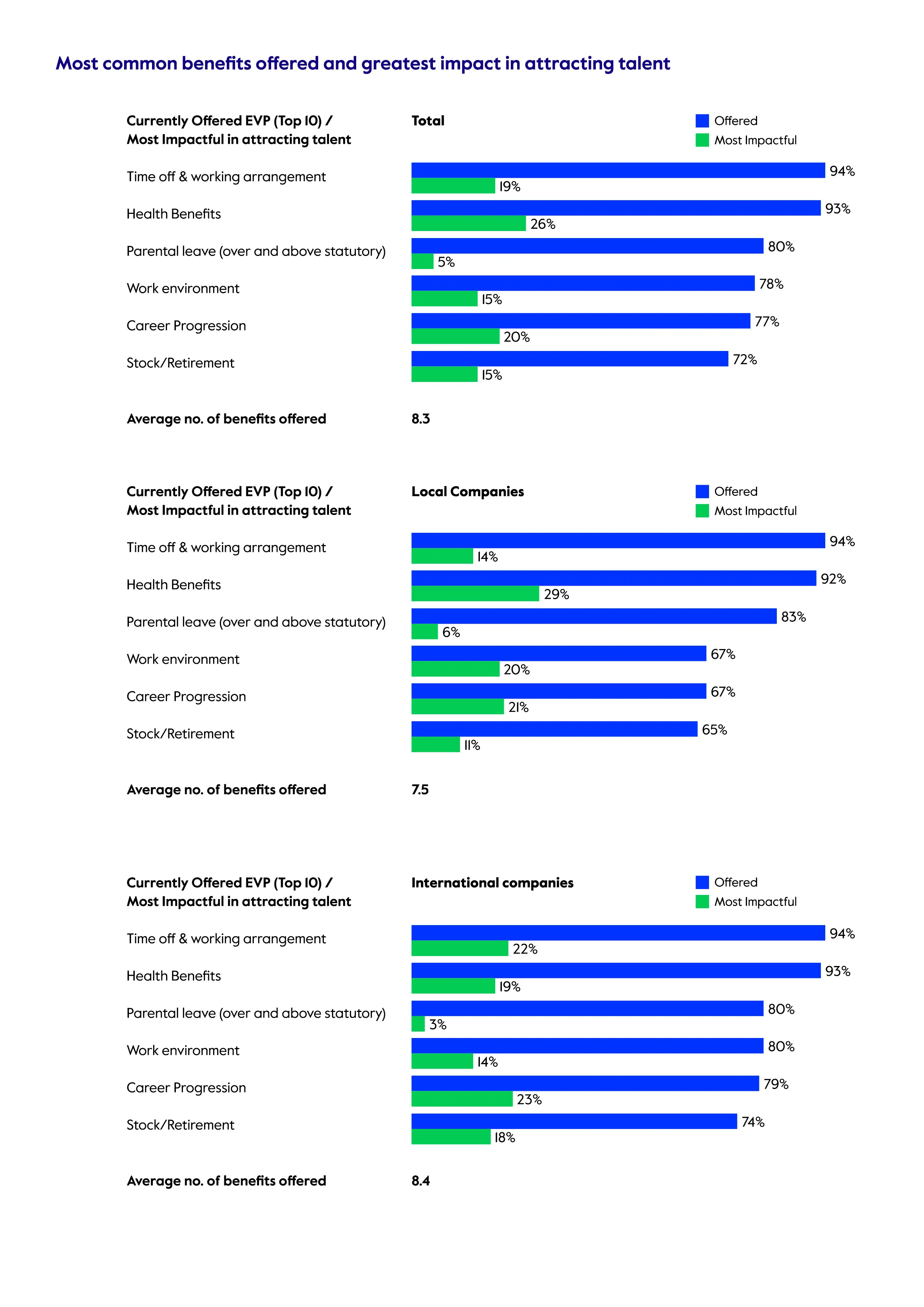
International organizations typically offer a wider range of health and well-being benefits, which reflects the higher budgets they have to spend on health and well-being. It may also be why close to half of them provide international health protection, as opposed to one in five domestic employers.
General wellness, preventive wellness tools, and mental health support are among the most frequently offered benefits but, again, there is a gap between domestic and international employers in terms of the scope of provision. For example, nutritional support is far more likely to be offered by international companies (59%) compared to local companies (23%).
International health insurance policies
International health insurance typically offers a wider range of health and well-being benefits, compared to domestic health cover. Close to half of international employers offer international health insurance to their staff, compared to one in five local entities.
The markets where international health insurance is ranked highest as an employee benefit are the UAE (#1) and Hong Kong (#2).
What’s the view from workforces?
Our research reveals a gap between employer intentions and employee perspectives. While nine in ten HR leaders indicate their organization offers health benefits as part of its EVP, only six in ten employees (57%) feel that their employers proactively support their health and well-being.
Employers which offer generous health and well-being benefits are meeting an immediate employee need: workers in markets across the globe are struggling to fund their healthcare costs. Over half of employees (59%) are not confident they can meet their medical needs and those of their family, with confidence particularly low in Singapore (70%) and Hong Kong (72%). With healthcare now such a major concern for employees, employers need to ensure their benefits packages properly account for this when attracting and retaining staff.
To some extent, failure to engage employees and potential hires is about poor communication, as many appear to be unaware of the benefits open to them. Six in ten HR leaders (58%) claimed that the benefits offered are underutilized, with general nutritional support and health & wellness preventive tools being identified as the most underutilized.
While it’s clear employees value health insurance, and international health insurance has the greatest value, many employees need more support to access the benefits they need.
Well-being is about more than just health benefits
Although priorities differ by market, employees are universally concerned about their well-being, and organizations can appeal to talent by addressing people’s broader health and vitality – including their physical and mental health, workplace well-being, and work-life balance.
Across the five markets surveyed, 93% of HR leaders said they offer health benefits as an EVP. In terms of what HR professionals felt was most attractive from the employee point of view, flexible time off and working arrangements are regarded as high value (top choice for 34%), followed by health benefits (26%), and a positive working environment (13%). This demonstrates the importance of a long-term well-being culture running through the organization.
These preferences differ notably between markets. Flexible time off and work arrangements are highly preferred in the US (top EVP for 45%) and UK (50%), but less so in Singapore (26%) and Hong Kong (18%). By contrast, health benefits are highly preferred among employees in Hong Kong (top EVP for 37%) and the UAE (30%). This might be explained by their relative unfamiliarity with personal family plans (compared to US employees for example), leading them to rely more heavily on employer coverage.
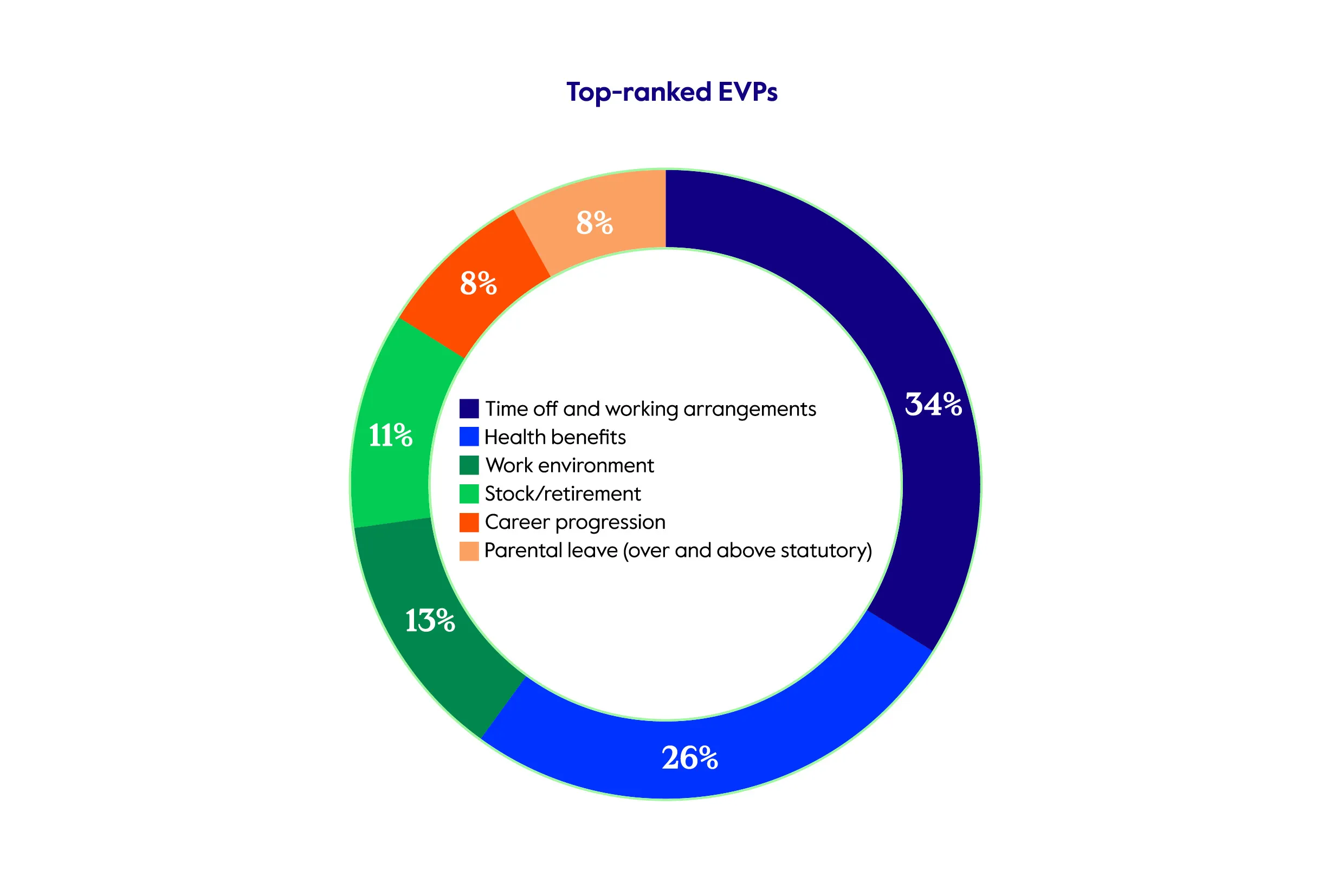
Challenges and Recommendations
The benefits of a comprehensive well-being strategy are clear, but a number of factors discourage or prevent companies from implementing one or upgrading their current plan. Price is naturally the main consideration, but others play a role – not least a lack of availability of comprehensive well-being plans in certain markets.
Looking at the broader benefits, mental health is often left out due to a lack of employee engagement or simply because it is not mandatory in that jurisdiction. At the same time, preventive health benefits are considered too complex to set up by many HR leaders.
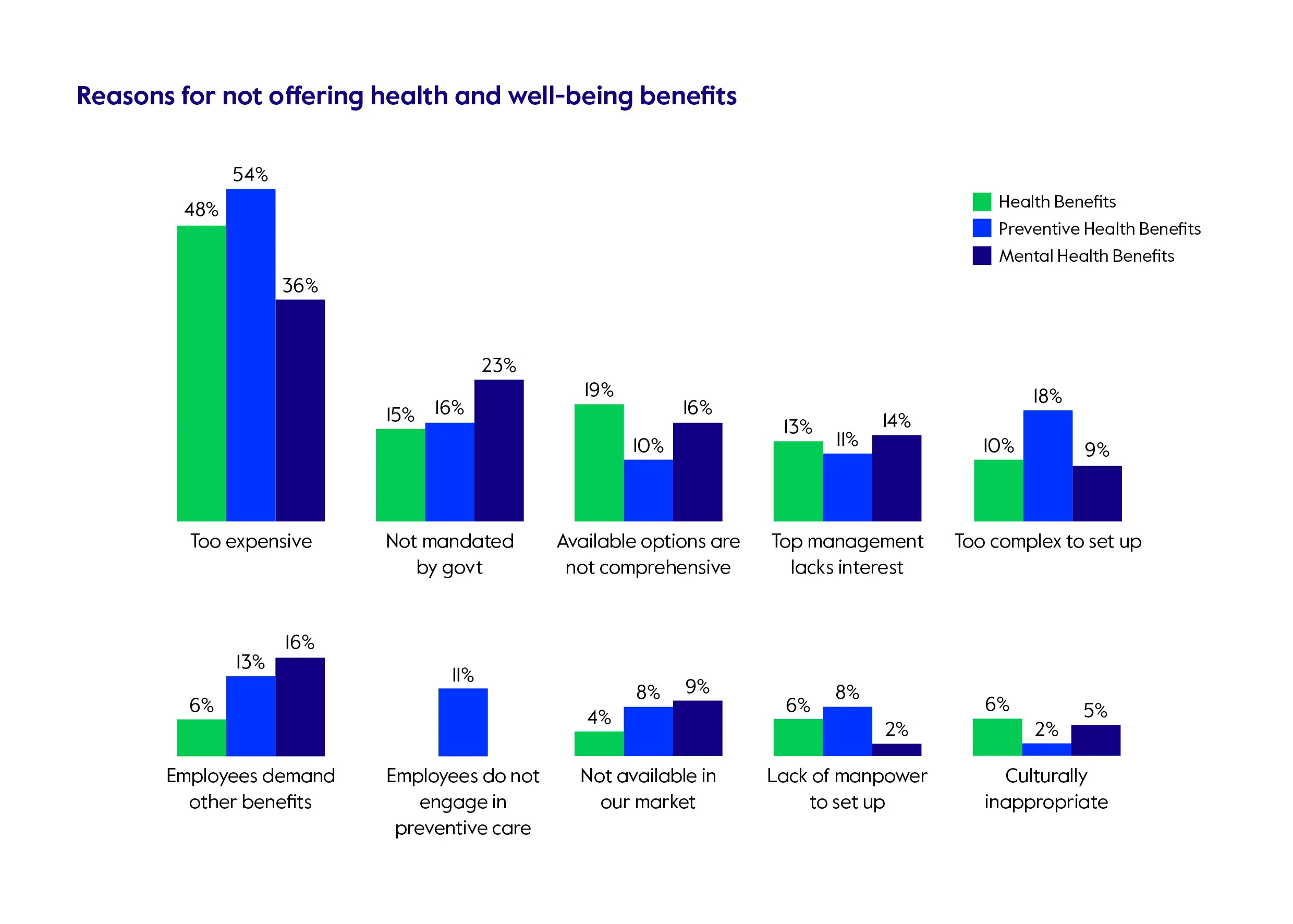
Even when a holistic plan is in place, the full potential of health and well-being benefits can be ineffective if benefits are underutilized. The top ten most offered benefits all suffer from underutilization. This could be due to lack of understanding on how to use these benefits, or because they are lower priorities for busy employees.
With a holistic system of benefits in place that is tailored to local needs, linked to other EVPs, and clearly communicated to all employees, organizations will be well placed to win and retain top talent, and to unleash their full potential. They are advised to adopt a comprehensive well-being approach designed to meet the particular needs of their employees, including a strategy to clearly communicate how these benefits can be accessed.
The key takeaway is that offering benefits is not in itself enough to drive real productivity and significantly improve retention. Rather, organizations need to value their people as their greatest resource, prioritizing them over business KPIs. People who feel prioritized will make the greatest impact in their organization.
Download the flyer to read Hong Kong results
Download the International Health 2024 Study
About the survey
we surveyed 1,000 managers and directors in human resources and benefits functions (HR leaders) in five markets – Hong Kong, Singapore, the US, UK, and UAE – asking about their focuses, priorities, challenges, and the results they have seen, from January to February 2024. To confirm these results and enhance the picture for employers, we have added perspectives from the end-user, based on a survey of 10,800 employees in 12 markets (Hong Kong, Singapore, the US, UK, and UAE, as well as Kenya, mainland China, the Netherlands, Spain, Switzerland, Belgium, and the Kingdom of Saudi Arabia) from May to June 2023.
Source
© Cigna Healthcare 2023
All Cigna Healthcare products and services are provided exclusively by or through operating subsidiaries of The Cigna Group.
This article serves only as a reference and is intended for informational purposes only. Nothing in this article constitutes legal, tax, financial planning, health or medical advice including diagnosis or treatment. Any reference to products or services offered by Cigna are available except where prohibited by applicable law and subject to terms and conditions.

